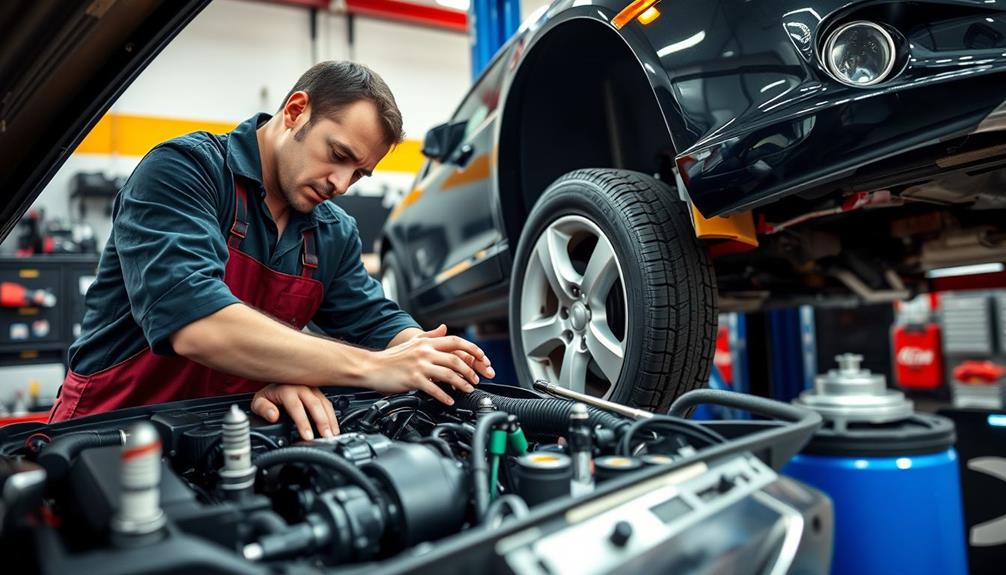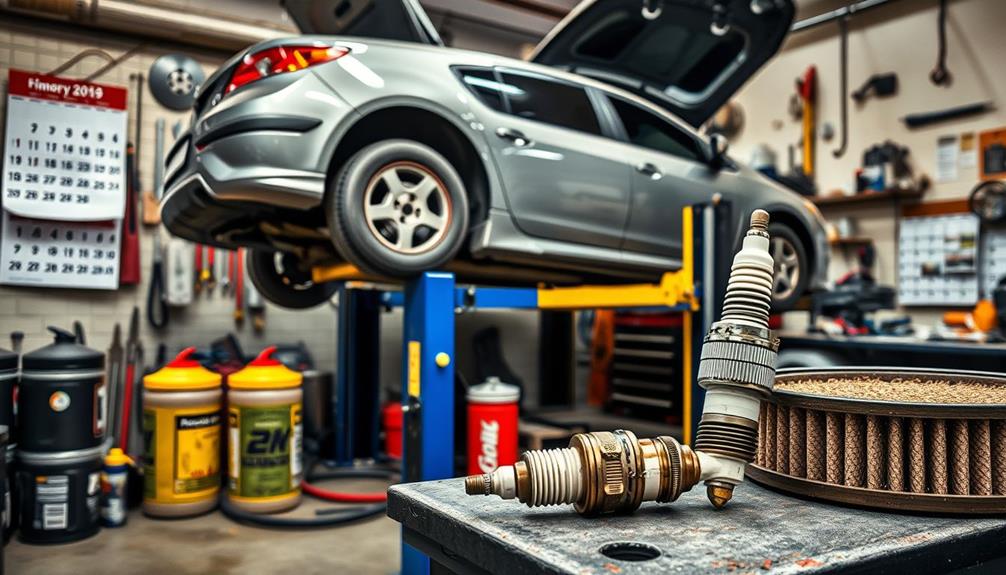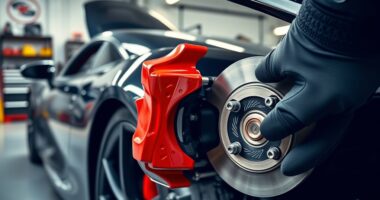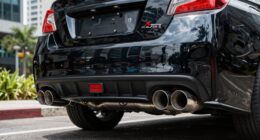A car tune-up is crucial for keeping your vehicle in top shape and preventing extensive damage. By optimizing engine performance and enhancing fuel efficiency, tune-ups save you money in the long run. During a tune-up, important components like the ignition and fuel systems are inspected, helping to catch issues before they grow. If you ignore this essential maintenance, you'll likely face reduced performance and costly repairs. To maintain your car's longevity and reliability, it's best not to skip tune-ups. You might be surprised at what you'll discover when exploring the specific benefits and recommendations.
Key Takeaways
- Regular tune-ups optimize engine performance and improve fuel efficiency, potentially saving you money on gas and repairs.
- Neglecting tune-ups can lead to decreased vehicle reliability and costly engine damage over time.
- Key components like spark plugs and fuel filters are inspected, ensuring optimal operation and safety.
- Tune-ups can extend a vehicle's lifespan by up to 50% through early detection of potential issues.
- Ignoring maintenance can result in reduced resale value, making it less appealing to potential buyers.
Understanding Car Tune-Ups
When it comes to maintaining your vehicle, understanding car tune-ups is crucial for keeping your engine running smoothly. A car tune-up is a thorough maintenance procedure designed to optimize engine performance and fuel efficiency.
During a tune-up, you'll want to inspect and adjust key engine components, such as the ignition system, fuel system, and various belts and hoses.
Regular maintenance tasks involved in a tune-up include diagnostics checks for error codes, fluid level assessments, and the replacement of worn components. This detailed approach helps guarantee your vehicle remains reliable and runs efficiently.
Depending on your car's age, condition, and driving habits, you might need a tune-up every 10,000 to 100,000 miles.
Ignoring these critical tune-ups can lead to decreased vehicle performance, reduced fuel economy, and potentially costly long-term engine damage.
To avoid these issues, consider consulting a professional mechanic who can guide you through the process. By prioritizing car tune-ups, you're investing in your vehicle's health and longevity, guaranteeing it remains in top condition for years to come.
Importance of Regular Maintenance
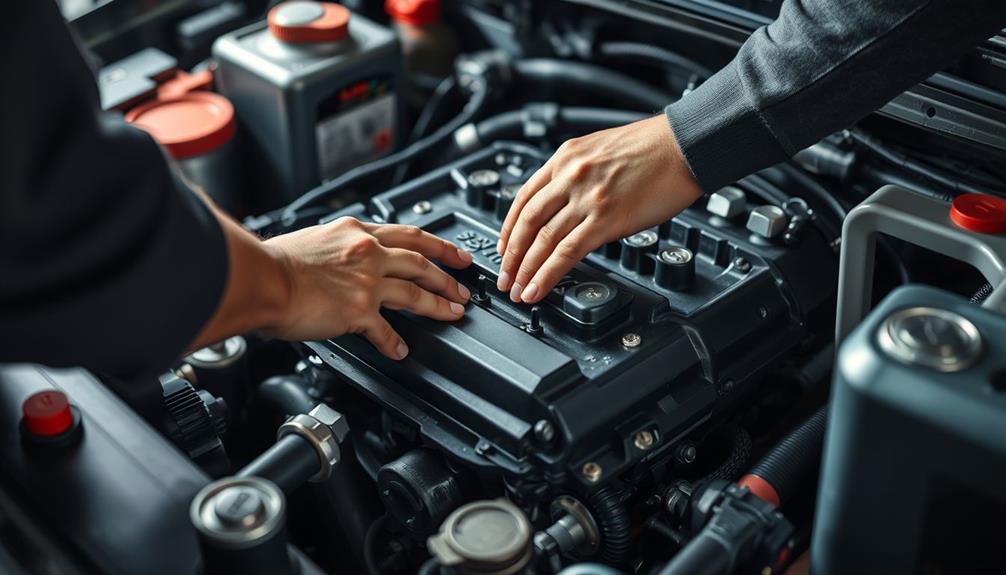
Regular maintenance is essential for preventing major issues that can arise from neglect.
By keeping up with tune-ups and routine checks, you not only enhance your vehicle's fuel efficiency but also save yourself from costly repairs down the line.
Taking these steps guarantees your car runs smoothly and lasts longer.
Prevent Major Issues
Over time, neglecting vehicle maintenance can lead to minor issues snowballing into major problems. Regular maintenance, including tune-ups, can help prevent these situations from arising. By addressing small concerns early, you save yourself from potentially costly repairs down the road.
A well-maintained vehicle operates at peak performance, ensuring that you get the most out of your engine's horsepower and acceleration. Ignoring tune-up recommendations can set you up for failure, resulting in decreased performance and reliability.
Additionally, regular tune-ups can extend your vehicle's lifespan by up to 50%, giving you peace of mind while driving. Furthermore, they can reveal potential safety concerns, such as worn brake pads or fluid leaks, which are essential for ensuring the safety of you and your passengers.
Enhance Fuel Efficiency
A simple tune-up can greatly enhance your vehicle's fuel efficiency. By ensuring that components like spark plugs and fuel injectors are functioning effectively, you can improve fuel efficiency by up to 10%. Regular maintenance keeps your engine running smoothly, preventing issues that can strain your vehicle and decrease gas mileage.
Here's a breakdown of how various maintenance tasks can impact fuel efficiency:
| Maintenance Task | Potential Fuel Efficiency Gain | Importance |
|---|---|---|
| Replace spark plugs | Up to 10% | Essential for ignition |
| Change air filter | 6-8% | Improves airflow |
| Clean fuel system | Reduces engine strain | Enhances overall efficiency |
| Check tire pressure | 3-4% | Reduces rolling resistance |
Regular inspections during a tune-up can also catch problems like misfiring engines, which can cut fuel efficiency by up to 25%. Don't underestimate the importance of these maintenance tasks; they keep your car efficient and save you money at the pump. Prioritize your vehicle's health with regular tune-ups for maximum fuel efficiency.
Key Components of a Tune-Up
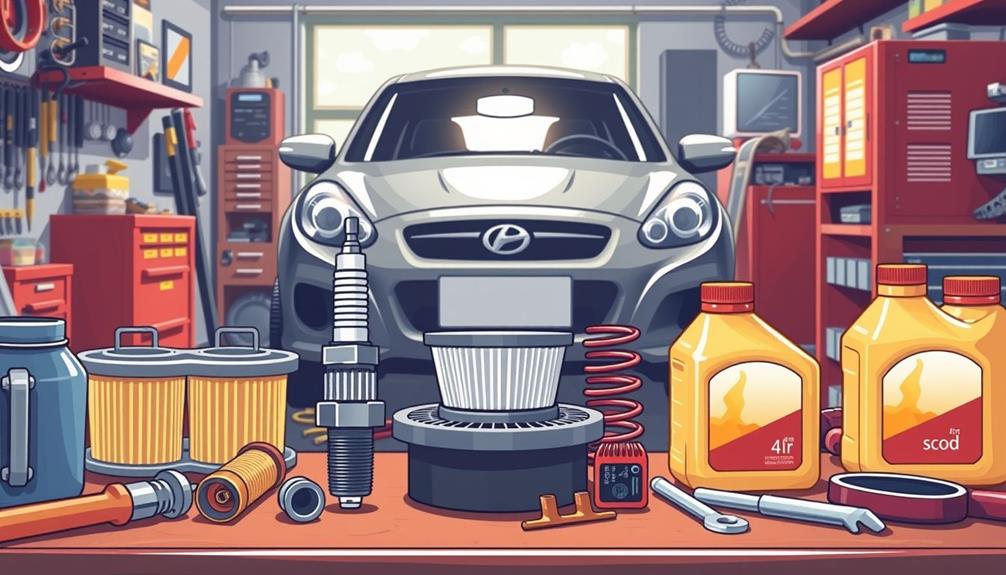
When you think about a car tune-up, you should focus on three key areas: the ignition system, fuel system, and engine components.
Each of these plays a critical role in keeping your vehicle running smoothly and efficiently. By ensuring these systems are inspected and evaluated, you can prevent potential issues and enhance your car's performance.
Ignition System Inspection
The ignition system inspection is an important part of any tune-up, focusing on key components like spark plugs, ignition coils, and wires that guarantee your engine runs smoothly. By examining these parts, you confirm peak performance and fuel efficiency. Worn or fouled spark plugs can decrease fuel efficiency by up to 30% and lead to rough engine performance.
Ignition coils play a significant role, transferring voltage from the battery to the spark plugs. If a coil malfunctions, you may experience misfires and a noticeable drop in engine power. Regular inspections help prevent starting issues, confirming your vehicle fires up every time.
Here's a quick overview of the key components:
| Component | Importance | Potential Issues |
|---|---|---|
| Spark Plugs | Essential for combustion | Worn plugs decrease efficiency |
| Ignition Coils | Transfers voltage to spark plugs | Faulty coils cause misfires |
| Wires | Connects ignition components | Damaged wires lead to failures |
Fuel System Evaluation
Conducting a fuel system evaluation is vital for maintaining your vehicle's performance and efficiency. During a tune-up, inspecting and cleaning your fuel injectors guarantees peak fuel flow, which directly impacts engine performance. Clogged fuel injectors can lead to poor combustion, so keeping them clean is essential.
Replacing the fuel filter is another important task. A clogged filter restricts fuel supply, resulting in reduced engine efficiency and potential damage over time.
Regularly checking your fuel system helps you identify issues like leaks or blockages early, preventing costly repairs and enhancing your vehicle's reliability.
Moreover, maintaining a clean fuel system can improve fuel economy by up to 10%. This means you'll spend less at the pump while maximizing your vehicle's potential.
A well-maintained fuel system not only enhances engine responsiveness but also reduces harmful emissions, aligning with environmental regulations and promoting cleaner air.
Engine Component Examination
After verifying your fuel system is in top shape, it's time to focus on the engine components that play an essential role in your vehicle's performance.
Regular maintenance checks are vital for keeping these parts functioning safely and efficiently. A professional inspection helps identify issues before they become major problems.
Key components to examine during a tune-up include:
- Ignition system: Spark plugs, wires, and ignition coils guarantee proper combustion.
- Belts and hoses: These parts are essential for the overall functionality of your engine; inspect them for wear and tear.
- Fluid levels: Checking engine oil, coolant, and brake fluid prevents overheating and guarantees safe operation.
- Diagnostic checks: Evaluate computer systems for error codes and performance issues.
Signs Your Car Needs a Tune-Up
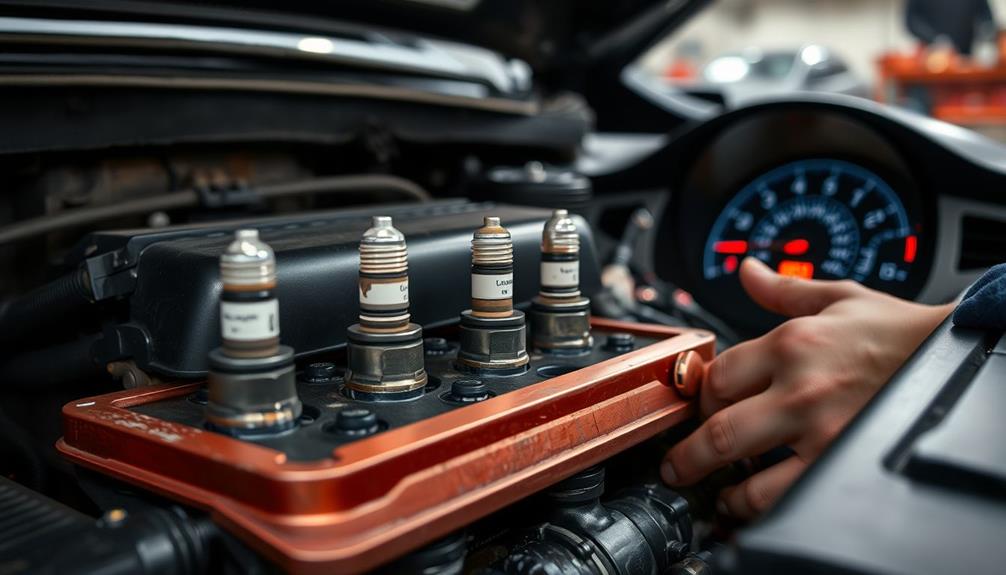
Recognizing the signs your car needs a tune-up can save you from costly repairs down the road. One of the first indicators is the Check Engine Light; if it's on, it's essential to diagnose the issue promptly.
Unusual noises or vibrations from the engine can also signal a need for a tune-up, as these may indicate underlying problems.
You might notice a decrease in fuel economy, which means your vehicle's performance is suffering. If you're getting fewer miles per gallon, it's time to pay attention.
Difficulty starting your engine or experiencing a rough idle when running are common signs that your car needs maintenance.
Additionally, if you feel a lack of acceleration or sluggish performance while driving, components like spark plugs or fuel injectors may require your immediate attention.
Regularly addressing these issues can prevent the need for a tune-up every few months, ensuring your vehicle remains in peak condition.
Tune-Up Frequency Recommendations

A regular tune-up is essential for keeping your vehicle running smoothly and efficiently. Understanding tune-up frequency can help you maintain peak performance and avoid costly repairs down the road.
Generally, older vehicles should have a tune-up every 10,000 to 12,000 miles or every two years. Newer models may stretch this interval to as much as 100,000 miles, thanks to advancements in engine technology.
To determine the right maintenance schedule for your vehicle, consider these factors:
- Always refer to your owner's manual for specific guidelines.
- Frequent short trips and stop-and-go driving may require more regular tune-ups.
- Environmental conditions like dusty or extreme climates can affect your tune-up frequency.
- Your overall driving habits can notably influence when you should schedule maintenance.
DIY Vs Professional Tune-Ups

Considering whether to tackle a tune-up yourself or seek professional help can greatly impact your vehicle's performance. DIY tune-ups can be feasible for basic tasks like changing air and fuel filters or replacing spark plugs. However, professional tune-ups offer much more. Mechanics have specialized tools and extensive training to diagnose and address complex issues that you mightn't even notice.
A well-maintained vehicle isn't only vital for safety, but it also aligns with responsible budget management by preventing costly repairs down the line.
While you might feel comfortable handling minor tasks, a professional tune-up includes thorough diagnostics that can uncover hidden problems. Many modern vehicles require specific equipment to access onboard diagnostic systems, making these professional assessments indispensable for accurate evaluations of engine performance and potential error codes.
Additionally, professional mechanics can provide insights into vehicle maintenance tailored to your car's make and model, which mightn't be readily available to DIY enthusiasts. Regular tune-ups from professionals not only guarantee detailed inspections but also help maintain warranties. Many manufacturers require documented service records for coverage, which you'd miss out on if you solely rely on DIY tune-ups.
Ultimately, balancing your skills with the expertise of a professional can help keep your vehicle running smoothly for years to come.
Cost Considerations for Tune-Ups
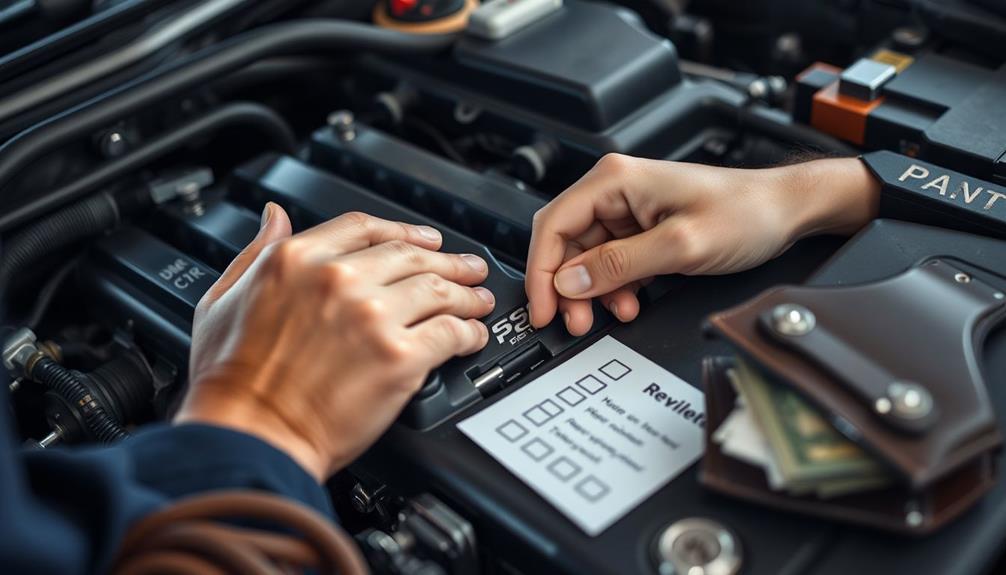
Understanding the costs associated with tune-ups can help you make informed decisions about your vehicle's maintenance. The average cost of a car tune-up ranges from $40 to $150, depending on your vehicle's make, model, and the specific tune-up services included. While this may seem like an expense, consider it a smart investment against costly repairs down the line.
Here are some critical cost considerations for tune-ups:
- Skipping regular tune-ups can lead to expensive repairs, like engine damage or reduced fuel efficiency.
- Mechanics might upsell unnecessary services, so familiarize yourself with common recommendations to save money.
- Following your manufacturer's maintenance schedule can help you avoid inflated repair bills by addressing minor issues early.
- A well-maintained car boosts your resale value, making it more appealing to potential buyers.
Enhancing Vehicle Longevity
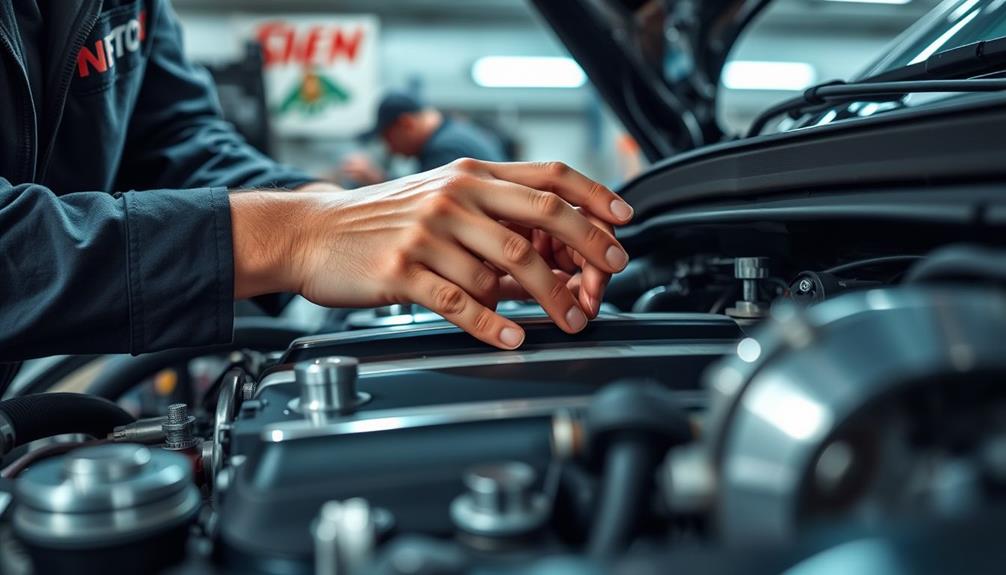
Regular tune-ups play an essential role in extending your vehicle's lifespan, guaranteeing that important engine components like spark plugs and filters work efficiently. A thorough tune-up includes routine inspections that help identify wear items like belts and hoses before they lead to significant mechanical failures.
By addressing these potential issues early, you can maintain peak performance and avoid costly repairs. Adhering to a maintenance schedule, as outlined in your owner's manual, can prevent minor problems from escalating.
When your engine components function correctly, you'll experience less loss of power and better fuel efficiency—up to 10% improvements are possible with proper fuel system optimization and fluid checks.
Additionally, combining gentle driving habits with regular tune-ups reduces stress on your engine, promoting longevity and reliability throughout your vehicle's life.
Trust a professional car service to keep your vehicle in top shape, as they know how to handle maintenance effectively. Ultimately, investing in regular tune-ups not only enhances your vehicle's durability but also guarantees that you enjoy a smoother, more economical ride for years to come.
Frequently Asked Questions
Are Tune Ups Necessary for Cars?
Yes, tune-ups are necessary for your car. They guarantee ideal engine performance, improve fuel efficiency, and prevent minor issues from becoming major problems. Regular maintenance keeps your vehicle running smoothly and extends its lifespan.
What Happens if You Don't Get a Tuneup on Your Car?
If you don't get a tune-up, your car's performance suffers. You'll face decreased fuel efficiency, potential breakdowns, and costly repairs. Ignoring maintenance can lead to major engine issues, leaving you stranded and frustrated. That’s why it’s important to stay on top of regular car maintenance. Simple tasks like checking and changing the oil, inspecting the spark plugs, and rotating the tires can make a big difference in keeping your car running smoothly. By following these car maintenance tips, you can avoid the headache of unexpected breakdowns and keep your car in top condition for years to come.
How Long Can a Car Last Without a Tune-Up?
How long can your car last without a tune-up? It can go 30,000 to 100,000 miles, but neglecting maintenance risks performance drops and costly repairs. Regular tune-ups keep your vehicle running smoothly and efficiently.
Is It Worth It to Get a Tune-Up?
Yes, it's worth getting a tune-up. Regular maintenance boosts your car's performance, saves on fuel costs, and prevents costly repairs. You'll enjoy a smoother ride and extend your vehicle's lifespan considerably. Don't overlook it!
Conclusion
In the grand symphony of vehicle care, a car tune-up is the maestro, guiding your engine to perform at its best. Skipping this essential maintenance is like ignoring a flat note in a beautiful melody—it can lead to discord down the road. By prioritizing regular tune-ups, you not only enhance your car's performance but also extend its lifespan, ensuring it continues to dance smoothly through every journey. So don't let your ride miss a beat—schedule that tune-up today!
